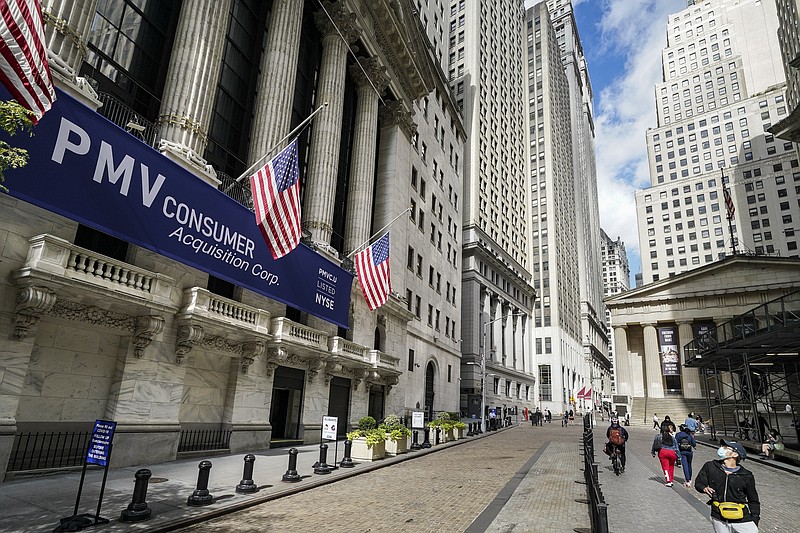Stocks rose again Friday on Wall Street, closing out their biggest weekly gain since July, as talks continue their start-and-stop drive on Capitol Hill to deliver more aid to the ailing economy.
The S&P 500 rose 0.9 percent following a weekslong run of mostly shaky trading. Traders have been worried about the inability of Congress to support the economy as it reels from damage caused by coronavirus shutdowns. They've been clamoring for more aid since the expiration of extra benefits for laid-off workers and other stimulus for the economy that Congress approved earlier this year.
The Dow Jones Industrial Average was up 135 points, or 0.5 percent, at 28,561, as of 1:23 p.m. Central time, and the Nasdaq composite was 1.2 percent higher. Technology stocks and companies that rely on consumer spending were driving much of the rally.
Despite the market's early gains, trading underneath the surface continued to be unsettled. Airline stocks climbed at the start of trading, only to drop quickly and then rise again. United Airlines rose 0.6 percent, American Airlines gained 1 percent and Delta Air Lines rose 0.7 percent.
Meanwhile, energy stocks went from helping to lead the market early on to slumping to the sharpest loss among the 11 sectors that make up the S&P 500.
Much of this week's focus has been on Washington, where President Donald Trump sent markets on a sudden skid Tuesday after he halted negotiations on a support package for the economy until after the election. Investors have been clamoring for such aid since the expiration of extra benefits for laid-off workers and other stimulus for the economy that Congress approved earlier this year. Economists said the outlook is grim without such support, and the chair of the Federal Reserve has said repeatedly it will likely be necessary.
Trump said House Speaker Nancy Pelosi was negotiating in bad faith when he called off the talks. But within a couple hours, he appeared to backtrack. He said he would back more limited programs that would send $1,200 payments to Americans and support the airline industry and small businesses specifically.
Pelosi on Thursday said she was not interested in a standalone measure to help airlines unless it was accompanied by a broader effort that includes COVID-19 testing and other programs that Democrats said are needed as part of a national strategy to "crush the virus."
The uncertainty over a deal lingered Friday as Trump declared on Twitter that talks on a new aid package are "moving along. Go Big!"
Meanwhile, White House economic adviser Lawrence Kudlow told reporters "developments are positive" ahead of a telephone conversation later Friday between Pelosi and Treasury Secretary Steven Mnuchin. At the same time, Senate Majority Leader Mitch McConnell said he doubts a deal will get done before the election.
"The fact that Trump reversed course, I think, has given people optimism again," said Randy Frederick, vice president of trading & derivatives at Charles Schwab.
Frederick said the uncertainty over another stimulus package remains a "substantial risk" to the market.
This week's rollercoaster - where the S&P 500 swung at least 1.4 percent for three straight days- is just the latest bout of volatility for a market that has been notably rocky for weeks.
"When the world's financial markets are at the mercy of the randomness emanating from the White House, it is hardly surprising that investors elsewhere would prefer to wait on the side-lines," Jeffrey Halley, of Oanda, said in a report. "Unfortunately, things are unlikely to settle down over the next few weeks."
Regardless of whether Washington can strike a deal before the election, some investors are getting more optimistic about the chances for a big support package in 2021. If the Democrats sweep the White House, Senate and House of Representatives, the thinking is they'll likely approve stimulus for the economy. That could help offset the higher tax rates and tighter regulations on businesses that investors also expect from a Democratic-controlled Washington. Wall Street is seeing a Democratic sweep as more likely than before.
Still, other challenges remain for the market. Chief among them is the still-spreading coronavirus pandemic, highlighted by Trump's own COVID-19 diagnosis.
Some areas of the economy are slowing following the expiration of Congress' last round of aid, stocks still look too expensive in the eyes of some critics and tensions continue to simmer between the United States and China.
The yield on the 10-year Treasury held steady at 0.78 percent.
In European stock markets, the French CAC 40 rose 0.7 percent, and the German DAX rose 0.1 percent. The FTSE 100 in London rose 0.6 percent.
In Asia, Japan's Nikkei 225 slipped 0.1 percent, and Hong Kong's Hang Seng lost 0.3 percent. Stocks in Shanghai jumped 1.7 percent after trading resumed following a weeklong holiday.

